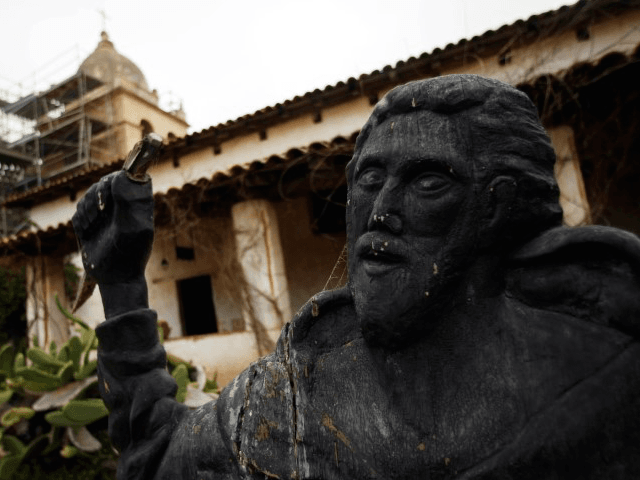Parishioners praying Sunday Mass at the Cathedral of Our Lady of the Angels in downtown Los Angeles on Sunday were confronted by one dozen demonstrators protesting the Pope’s decision to canonize Father Junipero Serra.
Carrying signs picturing Archbishop Jose Gomez, the head of the Los Angeles Arcgdiocese, as Adolf Hitler, with a toothbrush mustache and a swastika medallion, as well as other signs depicting Serra with a halo adorned with a swastika, the group marched straight to the gates of the cathedral.
Olin Tezcatlipoca, director of the Mexica Movement, told the Los Angeles Times that Serra committed “genocide” against the indigenous Spanish people. He added, “Serra set up forced labor camps, death camps. Women and children were raped the same way as the pedophile priests, and the church has hidden that.” He said Gomez refused to meet with the group.
Gomez has called Serra, who instituted the mission system in California, one of his “spiritual heroes,” and said his canonization is a “gift to California and the Americas.” In 1988, Pope John Paul II called Serra a “shining example of Christian Virtue and the Missionary Spirit.”
The archdiocese said that the Mexica Movement was unknown to them. The group released a statement prior to the protest in which they said: “We attempted to meet with Archbishop (Jose) Gomez over the proposed canonization of Junipero Serra. He refused to meet with us or to return our phone call. He does not care about the truth of the crimes and immorality of this white supremacist priest.”
Serra’s prospective canonization has elicited widely disparate views. One view holds that he and Franciscan priests who worked with him built agricultural and livestock centers and defended Indians from being enslaved. Others claim he beat natives who would not follow orders, captured those attempting to flee, and brought European diseases to the natives, wiping out whole villages.
Father Ken Laverone, a Sacramento priest heading the call for Serra’s canonization, said it is unfair to judge Serra by 21st century standards, telling the Times, “To blame Serra specifically is putting the blame in the wrong place. He considered Native Americans as human beings.”
Apprised of Laverone’s comment, Tezcatlipoca responded, “Didn’t they have the Ten Commandments then? Did they teach the golden rule?”

COMMENTS
Please let us know if you're having issues with commenting.